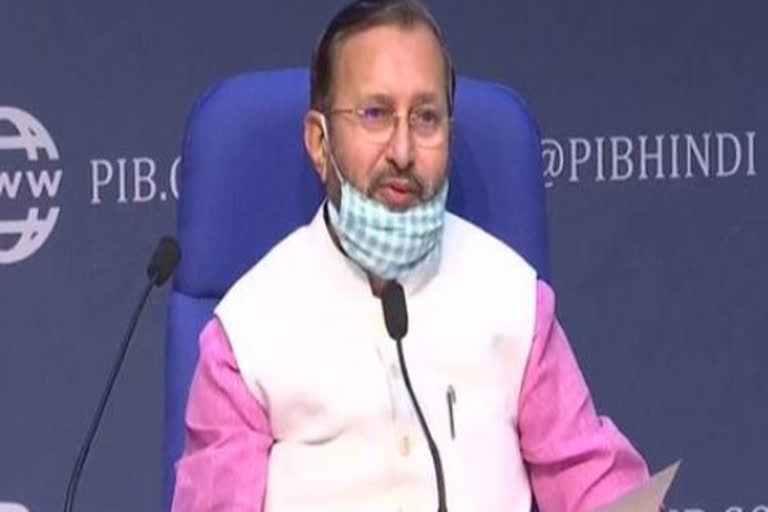New Delhi: In a significant decision for the farm sector, the Union on Wednesday approved an amendment to Essential Commodities Act to deregulate food items, including cereals, pulses and onion, and help raise farmers' income.
Briefing the media about the decisions of union cabinet, Information and Broadcasting Minister Prakash Javadekar said that it was a landmark decision which will benefit farmers.
"We have made farmer friendly amendments to the Essential Commodities Act. The regulatory environment has been liberalized for farmers through this decision. This is a landmark decision which will benefit farmers and transform the agriculture sector," he said.
He said farmers will now have the freedom to sell the product anywhere.
"There is an abundance of agricultural products. Through this decision, farmers have been freed from the Agricultural Producer Market Committee. The farmers will now have the freedom to sell the product anywhere to whoever makes better payment. We have moved towards One Nation One Market," he said.
Read more:Services activity contracts sharply in May due to COVID-19, firms cut jobs: PMI
Approval to the Farming Produce Trade and Commerce (Promotion and Facilitation) Ordinance, 2020
The Cabinet also approved 'The Farming Produce Trade and Commerce (Promotion and Facilitation) Ordinance, 2020' to ensure barrier free trade in agriculture produce.
The government also approved 'The Farmers (Empowerment and Protection) Agreement on Price Assurance and Farm Services Ordinance, 2020' to empower farmers to engage with processors, aggregators, wholesalers, large retailers and exporters.
Announcing the Cabinet decisions, Agriculture Minister Narendra Singh Tomar said,"This will go a long way in helping India's farmers while also transforming the agriculture sector."
Tomar said that 'The Farming Produce Trade and Commerce (Promotion and Facilitation) Ordinance, 2020' will promote barrier-free inter-state and intra-state trade and commerce outside the physical premises of markets notified under State Agricultural Produce Marketing legislations.
"This is a historic-step in unlocking the vastly regulated agricultural markets in the country," he said.
Tomar said that the Farmers (Empowerment and Protection) Agreement on Price Assurance and Farm Services Ordinance, 2020' will empower farmers for engaging with processors, aggregators, large retailers, exporters etc., on a level playing field without any fear of exploitation.
These proposals were part of the Rs 20 lakh crore economic package announced to help those affected due to the lockdown clamped to fight the spread of COVID-19 disease.
Govt clears ordinance to allow farmers to sell outside notified mandis
Paving the way for 'One Nation, One Agri Market' for farmers, the Union Cabinet on also approved an ordinance to allow barrier-free trade in agriculture produce outside the notified APMC mandis.
The Farming Produce Trade and Commerce (Promotion and Facilitation) Ordinance, 2020, proposes to bar state governments from imposing taxes on sale and purchase of farm produce undertaken outside the mandis and give farmers the freedom to sell their produce at remunerative prices.
Besides, any conflicts arising from the transactions will be dealt with exclusively by the Sub Division Magistrate (SDM) and District Collectorate within 30 days and not in the jurisdiction of civil courts.
At present, farmers are allowed to sell their agriculture produce at 6,900-odd APMC (Agriculture Produce Marketing Committees) mandis spread across the nation. There are restrictions for farmers in selling agri-produce outside the mandis.
Cab secretary-led empowered group, PDC formed to attract investments to India
The government also announced setting up of a high level empowered group of secretaries, to be chaired by the cabinet secretary, and a Project Development Cell (PDC) in ministries/ departments with a view to attracting investments to the country.
In order to provide support and facilitation to investors for investing in India, an Empowered Group of Secretaries (EGoS) is approved, the commerce and industry ministry said in a statement.
Its objectives include bringing synergies and ensuring timely clearances from different departments and ministries; to attract increased investments into India and provide investment support and facilitation to global investors; and to facilitate investments of top investors in a targeted manner and to usher policy stability and consistency in the overall investment environment.
It would also evaluate investments put forward by the departments on the basis of their project creation and actual investments that come.
It said these departments would be given targets for completion of various stages by the empowered group.
The cell is aimed at creating projects with all approvals, land available for allocation and with the complete detailed project reports for adoption/ investment by investors; and to identify issues that need to be resolved in order to attract and finalise the investments and put forth before the empowered group.
Cabinet okays ordinance to amend insolvency law; defaults due to COVID out of IBC ambit
The Cabinet has cleared an ordinance to amend the Insolvency and Bankruptcy Code (IBC) whereby fresh insolvency proceedings will not be initiated for defaults due to the COVID-19 pandemic, according to sources.
Payment defaults from March 25 -- the day when the nationwide lockdown to curb coronavirus infections began -- would not be considered for initiating insolvency proceedings for a certain period of time, they said.
The sources said the ordinance to amend the IBC has been approved by the Cabinet.
Three sections of the Code -- which provides for a market-linked and time-bound resolution process of stressed assets -- would be suspended. The time period would be for six months and not exceeding one year, they added.
The sources said an enabling provision has been approved by the Cabinet wherein the corporate affairs ministry can decide about the time period for which the three sections should be suspended.
(ANI and PTI Report)



